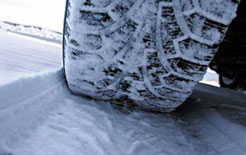
This content has been provided on behalf of Wheel Power
IT’S the same every winter here in the UK; at the first sprinkling of snow the country comes to a standstill.
At the beginning of 2013 the first blanket of snow cost the economy an estimated £470m per day, and a large part of this was down to our inability to get around. The silver lining of the disastrous cold snaps of recent years is that it’s finally making us take notice; we, the people of Britain, need to re-evaluate our winter weather logistics protocol.
Snow tyres are standard kit for drivers on the continent and they help drivers safely manoeuvre roads in all kinds of adverse weather, so when Jack Frost comes knocking there’s no reason why you can’t get to work on time.
Companies like Wheel Power have been providing drivers with top quality winter tyres for years, so if you want to avoid your company shutting down during the next Arctic blast it’s time to invest in a set for your company cars. So what is the real impact of winter tyres on our roads?
Snow tyres – not just for snow
The reason why snow tyres are compulsory in other countries and a rarity in Britain is simple; we only get an average 33 days of snowfall a year, and it only settles for around 16 days.
The infrequency of snow makes snow tyres seem like a large and unnecessary investment, but to think that is to ignore the wealth of other safety benefits snow tyres give.
It isn’t just staff not making it to the office on snowy days that is detrimental to businesses; snow tyres can significantly help your vehicle to cope with the added pressures that come with cold weather and rainy days, protecting your staff from avoidable accidents.
The ROI statistics may surprise you:
- 15% snow – snow is the smallest proportion of return on investment according to industry experts; really they should be considered winter tyres instead of snow tyres. They can cut your stopping distance in the snow by as much as 8 metres when you’re driving at a 30mph.
- 40% cold, dry weather – did you know that on a cold day, under 7°C, snow tyres can reduce your stopping distance by as much as 11 metres when you’re driving at 20mph? This is because their compound and tread pattern is more elastic which allows them to fare significantly better in the cold than summertime tyres.
- 45% wet weather – we may not get a lot of snow in Britain, but we certainly don’t want for rain. Improving our driving capabilities on rainy days is the most significant benefit of snow tyres for UK drivers, allowing up to a 4.8 metre reduction in stopping distance.
How do snow tyres work?
So what is it that makes snow tyres so much better for our cars in the cold than regular tyres?
Think of it this way, you wouldn’t head outside on a snowy afternoon wearing nothing but a t-shirt, shorts and a pair of flip flops, so why would you send your car out onto an icy road kitted out in tyres designed for the summer?
The performance of summer tyres is dramatically reduced in the winter because they become harder and less flexible in cold weather. In contrast, winter tyres are designed specifically to combat the cold. They are made from a compound that contains silica which aids their flexibility, and the tread contains more sipes that aid griping, and is designed to squeeze out the snow so it doesn’t become blocked.
The safest option for your winter driving
Improving the handling and breaking of your vehicles in the cold can help save you and your staff from some nasty accidents. Sales boom every year as more and more people notice the advantages that a quick change of tyres between October and March can bring them. They really are the safest option for your fleet.
This post was written by Emma Smith on behalf of Wheel Power, providers of a diverse range of tyres which includes second to none snow tyres, so you can find the perfect fit to protect your vehicle whatever the time of year.







